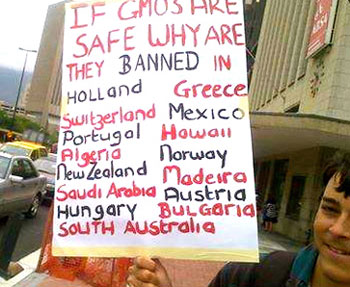Monsanto is in a bit of a pickle right now as it fights off accelerating attacks on its flagship product, Roundup.
Sales dropped some 34% in its agricultural division during the last quarter – which is dominated by Roundup – and after the World Health Organization declared glyphosate a "probable carcinogen" last year. California followed, stating it would list it as a known carcinogen.
This week, Monsanto filed suit against California to prevent that listing, insisting there is no link to cancer and that the listing would not only damage its reputation, but violate its "right to free speech" because it would have to label products with "false and/or misleading" statements about the threat they pose.
Read our article, Monsanto’s Cover Up Exposed, Glyphosate – Cancer Connection.

Even with sales down for the quarter, Roundup generated 4.8 billion in revenue last year. But the company is laying off 3600 employees – 16% of its workforce "to save on costs."
Monsanto has been struggling for investor confidence since the World Health Organisation’s declaration, and is also fighting off two lawsuits filed by US farm workers. They charge Monsanto for causing their cancer and for falsifying data through a prolonged misinformation campaign to governments and workers alike about Roundup’s safety.
"Monsanto assured the public that Roundup was harmless. In order to prove this, Monsanto championed falsified data and attacked legitimate studies that revealed its dangers. Monsanto led a prolonged campaign of misinformation to convince government agencies, farmers and the general population that Roundup was safe," says the NY state filing.
Residues of glyphosate have been found in the few samples of breast milk taken and are widely found in the air and water. And while the USDA annually tests for hundreds of herbicide and pesticide residues in food products and drinking water, glyphosate is not among them.
The one time it did test for glyphosate in a "special project" in 2011, it found residues in 271 of 300 soybean samples. They were all in the range the EPA deems safe (which is also being challenged), so testing is too expensive to be a priority, says USDA.
Monsanto is also going to court over PCBs, banned in 1979 but still persisting in the environment. Seattle filed a lawsuit this week, joining Spokane, San Diego, San Jose and Oakland, after decades of related lawsuits.
Seattle alleges Monsanto knew about the damage PCBs cause to people and wildlife, and seeks remuneration for the cleanup of various sites where testing revealed the chemicals in 80% of samples.
Monsanto Goes on Trial for Crimes against Humanity
The kicker comes on October 12-16, when Monsanto goes in front of the International Criminal Court in The Hague, Netherlands, for crimes against nature and humanity, and ecocide.
It will go in trial for its steady stream of toxic products, which have permanently damaged the environment and caused illness or death for thousands of people.
- PCBs: a Persistent Organic Pollutant that remains in the food chain and environment
- 2,4,5 T: a dioxin component of Agent Orange
- Roundup
- Bovine growth hormones
Dozens of global food, farming and environmental justice groups are taking them to court, including IFOAM Organics International, an umbrella organization for over 800 organizations in 100 countries.
The Criminal Court will use the UN’s "Guiding Principles on Business and Human Rights" to rule and assess damages for Monsanto’s acts against human life and the environment.
The court will also consider whether to reform international criminal law to include crimes against the environment –ecocide – as a prosecutable criminal offense. This would be the only way to guarantee the rights of humans to a healthy environment and the right of nature to be protected.
"Monsanto is able to ignore the human and environmental damage caused by its products, and maintain its devastating activities through a strategy of systemic concealment: by lobbying regulatory agencies and governments, by resorting to lying and corruption, by financing fraudulent scientific studies, by pressuring independent scientists, and by manipulating the press and media. Monsanto’s history reads like a text-book case of impunity," says Andre Leu, president of IFOAM.
"Monsanto promotes an agro-industrial model that contributes at least one third of global greenhouse gas emissions; it is also largely responsible for the depletion of soil and water resources, species extinction and declining biodiversity, and the displacement of millions of small farmers worldwide. This is a model that threatens peoples’ food sovereignty by patenting seeds and privatizing life," says MonsantoTribunal.org.
Last year, two-thirds of EU countries and Russia banned GMO crops, and Venezuela followed suit in January.
Meanwhile, the USDA just approved another variety of GMO corn from Monsanto in addition to soybeans and cotton last year. It also gave the go-ahead to GMO salmonand a GMO potato by JR Simplot. And it rescinded the label for grass fed meat.
In some good news, Campbell Soup Co. announced it will voluntarily begin labeling all products that contain GMOs – the first major food company to do so. It also announced it supports national mandatory labeling and will "withdraw from all efforts led by coalitions and groups opposing such measures." But it maintains that GMOs are safe.
Learn more about the citizen tribunal at The Hague:
